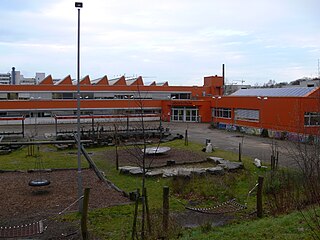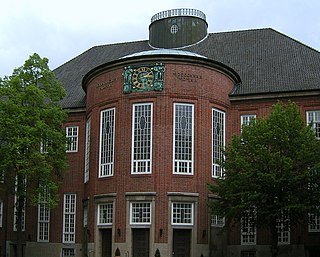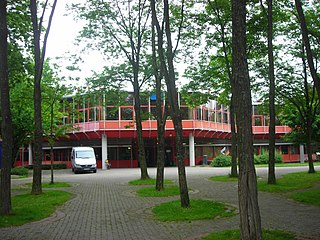
Gymnasium is a term in various European languages for a secondary school that prepares students for higher education at a university. It is comparable to the US English term preparatory high school. Before the 20th century, the gymnasium system was a widespread feature of educational systems throughout many European countries.
Abitur, often shortened colloquially to Abi, is a qualification granted at the end of secondary education in Germany. It is conferred on students who pass their final exams at the end of ISCED 3, usually after twelve or thirteen years of schooling. In German, the term Abitur has roots in the archaic word Abiturium, which in turn was derived from the Latin abiturus.

Education in Germany is primarily the responsibility of individual German states, with the federal government only playing a minor role.

A Hauptschule is a secondary school in Germany, starting after four years of elementary schooling (Grundschule), which offers Lower Secondary Education according to the International Standard Classification of Education. Any student who attends a German elementary school can go to a Hauptschule or Gesamtschule, while students who want to attend a Realschule or Gymnasium need to have good marks in order to do so. The students spend five to six years at the Hauptschule, from 5th to 9th grade. They finish around age 15 to 17.

Gymnasium, in the German education system, is the most advanced and highest of the three types of German secondary schools, the others being Hauptschule (lowest) and Realschule (middle). Gymnasium strongly emphasizes academic learning, comparable to the British sixth form system or with prep schools in the United States. A student attending Gymnasium is called a Gymnasiast. In 2009/10 there were 3,094 gymnasia in Germany, with c. 2,475,000 students, resulting in an average student number of 800 students per school.
Germany uses a 5- or 6-point grading scale (GPA) to evaluate academic performance for the youngest to the oldest students. Grades vary from 1 to 5. In the final classes of German Gymnasium schools that prepare for university studies, a point system is used with 15 points being the best grade and 0 points the worst. The percentage causing the grade can vary from teacher to teacher.
During the last decades, the number of people living in poverty in Germany has been increasing. Children are more likely to be poor than adults. There has been a strong increase in the number of poor children. In 1965, only one in 75 children lived on welfare, in 2007 one in 6 did.

The Kaiserin-Friedrich-Gymnasium is a secondary school in Bad Homburg vor der Höhe, Hesse, Germany.
Education in Hamburg covers the whole spectrum from kindergarten, primary education, secondary education, and higher education in Hamburg. The German states are primarily responsible for the educational system in Germany, and therefore the Behörde für Schule und Berufsbildung is the administrative agency in Hamburg. The Behörde für Wissenschaft und Forschung has the oversight for universities and colleges.
The Gesamtschule am Gluckenstein is a Gesamtschule in Bad Homberg vor der Höhe, Hesse, Germany.

The Laborschule Bielefeld is an alternative school located in the city of Bielefeld, Germany. It has received significant media coverage in Germany because it is one of Germany's few "democratic" schools. The Laborschule has been called one of Germany's best schools by the media. One of the German teachers' unions has objected to this.

Education in Berlin covers the whole spectrum from nurseries, kindergarten, primary education, secondary education, apprenticeships, higher education, adult education and research in Berlin. The German states are primarily responsible for the educational system in Germany.

The Gelehrtenschule des Johanneums is a Gymnasium, or grammar school, in Hamburg, Germany. It is Hamburg's oldest school and was founded in 1529 by Johannes Bugenhagen. The school's focus is on the teaching of Latin and Ancient Greek. It is proud of having educated some of Germany's political leaders and some of Germany's notable scientists. The school is operated and financed by the city of Hamburg.
The extended secondary school, officially twelve-class general educational polytechnic secondary school, abbreviation EOS, was the standard institution of higher education in the education system of East Germany. It finished with the final examination called Reifeprüfung /Abitur (A-Level) at the end of the 12th grade, granting the Reifezeugnis, the certificate of eligibility for university entrance. The school structure was a four-class comprehensive school without any internal or external differentiation. The EOS was established in 1959 to replace the hitherto existing Oberschule as laid down by the Act on Socialistic Development of the School System in the German Democratic Republic effective December 2, 1959. The designation Gymnasium was not common in East Germany.

The German International School New York is a private, bilingual (German/English) college preparatory school that enrolls over 400 students in grades Pre-K through 12. The School is located in White Plains, New York, approximately 25 miles north of New York City, and is divided into three schools on the same campus: the Lower School, the Middle School and the Upper School.

The Odenwaldschule was a German school located in Heppenheim in the Odenwald. Founded in 1910, it was Germany's oldest Landerziehungsheim, a private boarding school located in a rural setting. Edith and Paul Geheeb established it using their concept of progressive education, which integrated the work of the head and hand. The school went bankrupt and was closed in 2015, following the revelation of numerous cases of sexual abuse of students.

There are five French-German secondary schools known in German as Deutsch-Französisches Gymnasium (DFG) and in French as lycée franco-allemand (LFA). Mixing students, teachers and teaching methods of both countries, DFG/LFAs are highly selective schools of excellence. Their teachers are paid by the French and German states, and tuition is free of charge.

The DFG / LFA Freiburg is a DFG/LFA, a public French-German secondary school in Freiburg im Breisgau, Germany. It offers free education from grades 5 through 12.

Jürgen Leo Müller is a German medical specialist for neurology and psychiatry. He is a professor for forensic psychiatry and psychotherapy at the University of Göttingen as well as chief physician for forensic psychiatry and psychotherapy at the Asklepios Clinic in Göttingen. His particular scientific interest lies in the empirical research of forensically relevant disorders with a particular focus on personality disorders, psychotherapy as well as violent and sex offenders. In addition to that he places special emphasis on the usability of empirical techniques to responding legal questions.

Hermann Bausinger was a German cultural scientist. He was professor and head of the Ludwig Uhland Institute for empirical cultural science at the University of Tübingen from 1960 to 1992. The institute has focused on the culture of everyday life, the history of traditions, and the research of narration patterns and dialects. His history of literature from Swabia from the 18th century to the present was published for his 90th birthday.













